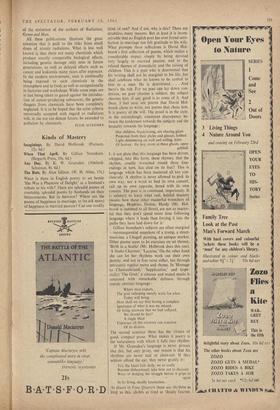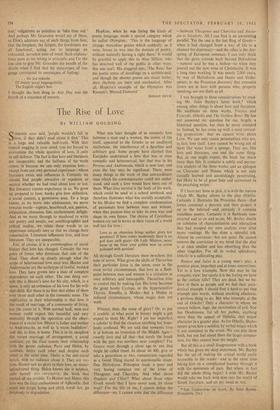Kinds of Mastery
The Rats. By Alan Sillitoe. (W. H. Allen, 15s.) WHAT is there in English poetry to set beside 'She Was a Phantom of Delight,' as a husband's tribute to his wife? There are splendid poems of courtship, splendid poems by husbands on their bereavements. But in between? Where are the poems of happiness in marriage, or (to ask more) of happiness in married passion? Can one readily
think of one? And if not, why is this? There are doubtless many reasons. But at least it is incon- ceivable that no English poet has ever found satis- faction in marriage nor felt gratitude to his wife.
What prompts these reflections is David Hol- brook's first collection of poems, which makes a considerable impact simply by being devoted very largely to married passion, and to the related themes of domesticity and the raising of children. This is a poet who is determined that his writing shall not be marginal to his life, but shall celebrate what he knows to be central to him as a man. He is determined. . . . And there's the rub. For no poet can lay down con- ditions, no poet chooses a subject; the subject chooses him, if any good is to come of it. And these, I feel sure. are poems that David Hol- brook chose to write, not poems that chose him.
• It is poetry of the will. The proof is in the style, in the astonishingly consistent discrepancy be- tween the tenderness towards the subjects and the brutality towards the language:
Our children, breakfasting, arc chasing glints Projected from their plates and glasses, lobbed Light shimmering on wall and ceiling, hints Of heaven: the boy stares at these ghosts, open- gobbed. L it not plain that this language has been driven, whipped, into this form, these rhymes; that the ' rhythm, cruelly wrenched round three line- endings in turn, has died on its feet? This is language which has been mastered all too con- clusively. A rhythm is never allowed to pick its own way, nor a word to find its own consort, call up its own opposite, breed with its own cousins. The poet is in command, imperiously. It is salutary to learn what real, baleful mastery means; how those other masterful wrenchers of language, Hopkins. Donne, Hardy (Mr. Hol- brook is indebted to all three), are not so master- ful that they don't spend more time following language where it leads than forcing it into the paths they have laid down for it.
Gillian Stoneham's subjects are often marginal - inconsequential snapshots of a tramp, a street- musician, a Chagall painting, an antique market. Other poems seem to be exercises on set themes, 'Birth in a Stable' (Mr. Holbrook does this one), 'A Snake-Charmer,' Lazarus.' On the other hand she can let her rhythms work out their own destiny, and not in free verse either, but through intricately regular metre and rhyme. In 'Homage to Chateaubriand,"Supplication,' and (espe- cially) 'The Goat,' a sinuous and muted music is sustained with remarkable deftness through mainly abstract language:
Where man expects,
The goat unhoping merely waits for what Today will bring.
How shall we say that having a complete Ignorance of what it was we missed.
Or being unaware that we had suffered, We should be less?
A single bleat Expresses all this creature can conceive Of its distress.
The second sentence there has the virtues of good, compact prose. What makes it poetry is the naturalness with which it falls into rhythm.
If Mr. Gransden's language is never prosaic like this, but only prosy, one reason is that his rhythms are never taut or clean-cut. If they seldom offend the car, they never gratify it :
Yes, the heart fails daily, we so easily
Become disheartened, take time out to discover Ways of dodging the struggle before it grips us again In its living, deadly fascination.
At places in Four Quarters there are rhythms as limp as this, v lichds as tired as 'deadly fascina-
tion,' vulgarisms as pointless as 'take time out.' And perhaps Mr. Gransden would say of these, as Eliot's admirers say of such things from him, that the limpness, the fatigue, the tawdriness are all functional, acting out in language an exhausted, nerveless state of mind. Such explana- tions seem to me wrong in principle, and I'm the less able to give Mr. Gransden the benefit of the doubt when I find that his stereotypes of lan- guage correspond to stereotypes of feeling: . . . the last redoubt
Of twenty years' impregnability The English virgin's bed.
I thought the best thing in Any Day was the fourth of a sequence of sonnets. Hopkins, when he was listing the kinds of poetic language, made a special category which he called Olympian: 'This is the language of strange masculine genius which suddenly, as it were, forces its way into the domain of poetry, without naturally having a right there.' It would be graceful to apply this to Alan Sillitoe, who has deserved well of the public in other ways. But one can't. His doggerel epic, 'The Rats,' has the poetic status of doodlings on a scribble-pad; and though the shorter poems are much better, their rhythms are inert and mechanical. After all, Hopkins's example of the Olympian was Rossetti's 'Blessed Damozel.'
DONALD DAVIE











































 Previous page
Previous page